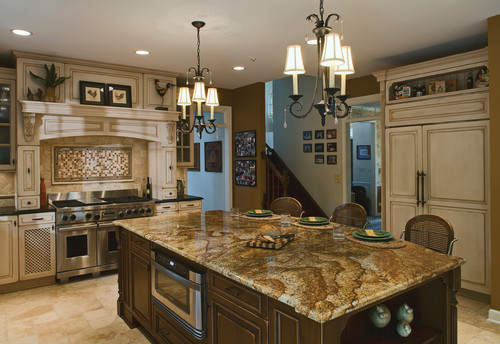BUT it is not a problem like they lead you to believe!
All stone is porous, some more than others, but those pores can be sealed. When they are sealed properly they will not accept other substances. Keep in mind, that if something can go in, then it also can come out. Stains can happen, but most of the time they are a result of a granite not being sealed or an individual using the countertop abnormally.
For example: a grape juice spill left overnight on a light stone will most likely stain, but how many of us leave spills on our countertops overnight? As long as the granite is sealed properly and you remove liquids and foods in a timely manner, then you should be fine.
Oh, and with a little elbow grease you will most likely be able to get that grape juice stain out any way.
There are conflicting opinions about sealing granite. The Marble Institute of America has this to say...
Marble Institute of America Statement of Position On Sealing Natural Stone Countertops
Most granite countertops do not need to be sealed. Before 1995 there were very few quality penetrating sealers on the market and there were very few cases of staining. Both prior to and after the availability of penetrating sealers, no cases of food poisoning, radon, or food preparation issues associated with treated or untreated granites have been reported. If a homeowner cleans their countertops after each meal, they will rarely, if ever, have staining or cleanability issues with granite. All this being said, many granite countertops receive additional benefit from being sealed. That benefit is the further reduction of moisture migration into an already moisture resistant surface.
Should natural stone counters be sealed? In many cases it makes sense to seal marble and granite countertops with a quality sealer. The product should have a life expectancy of ten to fifteen years and be of an oliophobic (resistant to water and oil based stains) nature. Once properly sealed, the stone will be more resistant against everyday dirt and spills.
In today’s natural stone industry, many species of granite receive a resin treatment at the factory where the blocks of granite are cut into slabs and then polished. The treatment is used to fill microfissures, indentations and other minor characteristics that are found in many natural stones. The reason for the resin treatment is to address what most consumers consider as imperfections, but in reality are “birth marks”. The consuming public gravitates to perfection, defined as no “birth marks,” and so the marble and granite industry tries to fulfill the desire. Both resined as well as unresined slabs will outlast most of our lifetimes. Granite should, and in most cases will, be the last countertop surface a person will buy, providing a strong return on investment. The bottom line: Sealing resin treated countertops may increase the resistance of the already resistant nature of stone (adopted 11/8/06).
Dimension Stone Design Manual, Version VII, page 3-5, 3-6
 |
| Photo: HI Consumption |
I personally agree more with The Marble Institute of America than the conventional thinking of sealing granite countertops once per year. The granite in my house is not sealed and I probably won't ever seal it! I have even TRIED to stain my granite by leaving oil on it for 16 hours and it didn't do a thing.
At MGS by Design we seal every countertop that we install (unless you tell us not to). We do this as an "insurance" policy and to make our clients feel more at ease.






3 comments:
Thanks for posting this about sealer. Sealer is one of the things about granite that I'm just not sure about.
As an interior designer I have a lot of people ask me for my opinion on sealer.
My kitchen is sealed, but I have honed granite. So we needed that enhancing sealer stuff.
This article gave me a lot to think about anyway.
I really like that first kitchen with the Delicatus. Beautiful!
Awww, c'mon. Tell the story!
Post a Comment